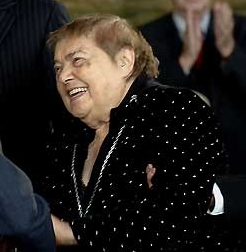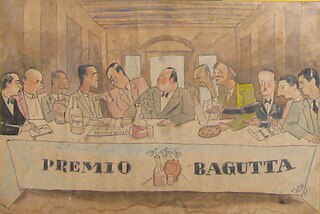Related Research Articles

Ambrogio Fogar was an Italian sailor, writer, rally driver, adventurer, and television presenter. He was a Commander of the Order of Merit of the Italian Republic, gold medal for athletic value, gold medal for marine value, gold medal to memory and other.

Fernanda Pivano was an Italian writer, journalist, translator and critic.

The Bagutta Prize is an Italian literary prize that is awarded annually to Italian writers. The prize originated among patrons of Milan's Bagutta Ristorante. The writer Riccardo Bacchelli discovered the restaurant and soon he regularly gathered numerous friends who would dine there together and discuss books. They began charging fines to the person who arrived last to an appointed meal, or who failed to appear.

Sandro Veronesi is an Italian novelist, essayist, and journalist. After earning a degree in architecture at the University of Florence, he opted for a writing career in his mid to late twenties. Veronesi published his first book at the age of 25, a collection of poetry that has remained his only venture into verse writing. He has since published five novels, three books of essays, one theatrical piece, numerous introductions to novels and collections of essays, interviews, screenplays, and television programs.
Valeria Montaldi is an Italian journalist and writer.

Barbara Baraldi is an Italian mystery and fantasy writer.

Antonio Moresco is an Italian writer.

Cinzia Giorgio is an Italian writer.
"Good Girls Don't" is a 1979 song by The Knack.

Paola Turci, is an Italian singer, songwriter, performer and author.

Marina Ripa di Meana was an Italian socialite, writer, actress, director, stylist, activist and television personality.

Good Girls Don't Wear Trousers is an autobiographical novel by Lara Cardella. It was published by Mondadori in 1989, when the author was only 19.

Volevo i pantaloni is a 1990 Italian coming-of-age drama film directed by Maurizio Ponzi. It is based on the bestseller novel Good Girls Don't Wear Trousers written by Lara Cardella. The film was a bomb at the Italian box office, grossing about one billion lire in spite of a budget of five billion lire.
Ottavia Vitagliano was an Italian writer, editor and publisher.
Rosa Giannetta Alberoni was an Italian novelist, journalist, and professor of sociology.
Giorgio Scerbanenco was an Italian crime writer.
Maria Messina was an Italian writer.
Rosetta Loy was an Italian writer. She was the recipient of the Rapallo Carige Prize for Le strade di polvere in 1988.

Laura Conti was an Italian anti-fascist partisan, doctor, environmentalist, socialist politician, feminist, and novelist, considered one of the avant-garde figures of Italian environmentalism.
Carola Prosperi was an Italian writer, feminist and journalist.
References
- 1 2 "VOLEVANO IL PALLONE - la Repubblica.it". Archivio - la Repubblica.it (in Italian). 1990-01-05. Retrieved 2023-05-17.
- ↑ "Sicily Shuns Teen Author of Sex Book". Argus-Leader. Sioux Falls, SD. June 22, 1989. p. 6. Retrieved January 5, 2025– via Newspapers.com.

- ↑ Cardella, Lara (1995). Volevo i pantaloni 2 (in Italian). A. Mondadori. ISBN 978-88-04-40416-3.